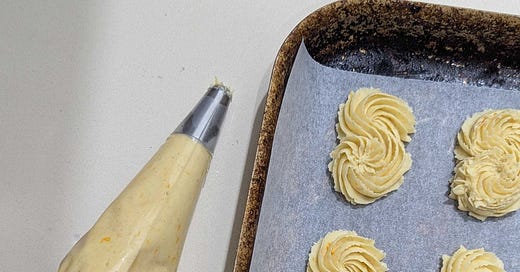Of all the things I did to survive being a professional cook, one definitely stands the testament of time over most others.
It’s not refined dicing skills; it’s not noticing that a bench isn’t 100% wiped down. It’s not even having “asbestos fingers” that can quickly touch a ridiculously hot frying object to flip it over.
The essential skill is a unrelenting, unwavering and persistent tolerance of repetition.
The repetition of cooking the same things day in and day out, obviously.
But also the repetition of the same interactions, the same conversations, the same call backs.
This is the one thing; the repetition of a call back “oui, chef” or “yes, chef” that if you can not understand, than professional cooking likely isn’t your jam.
You need to want to constantly repeat yourself, to assure, to confirm. You can’t get annoyed about it. You can’t get sarcastic about it. You just have to let it become a part of your being, like a walking or breathing.
This was problematic for me at the beginning of my career because I started my apprenticeship well into my 20’s. I wasn’t “young” per se, and wasn’t really in the mood to be molded. Changing my career from life long uni student to 60 hour a week apprentice chef was a hard turn.
Repeating a call back like “oui, chef” or telling someone I was coming around a corner by saying “corner” felt ridiculous, repetitive and weirdly unnecessary. The first time I said it it felt fake, I felt like a fake. A fraud.
But that’s how it is in all the TV shows right? All the “Boiling Point” Gordon Ramsey rips you see.
The reality of cheffing is that it is that, it is cliche but it’s a working cliche.
The other reality is that I am a woman working in a field that is male dominated. I was grateful to work in kitchens for 85% of my career where that didn’t really matter.
I wasn’t just “put on pastry” (even though it requires, some would say, the most skill), I wasn’t given less work because women are perceived as weaker.
This is something I am really grateful for, a lot of the teams I worked with and for were filled with generous, kind and giving people who genuinely did want you to be better at the skills you were trying to refine.
I digress, in kitchens you learn pretty quickly to just get over yourself and say back “yes, chef” with the same vigor as the rest of the team. In some ways, I didn’t feel like I had earnt being able to say it, but through repetition, I learn to ignore those feelings and get used to it.
Through being a chef, I realised what matters is the act of repetition and how powerful it can be, both in a negative way and a positive way.
Always being ready to try again, to fail again, and (hopefully) fail better.
Repetition creates belief. Belief that you can do something, day in and day out and make tiny 1% steps to being slightly better at something every day (and even if you don’t think you can, you have to; so you just do it anyway).
Later in my career I learnt that a lot of chefs care a lot less about how fast someone is at doing something, or even how nicely you can brunoise an onion. What they want is what we all really want, someone who cares to work alongside with, who can repeat back to them a good story day after day.
For a long time I questioned who I was, what were my skills and to be honest, if I was even any good at being a chef.
In my job now, repetition isn’t as essential as it was when I was a chef. But the echos of repetition, help me feel like I know what I am doing, that I am capable and that sometimes I don’t need to listen to myself because I just know what to do in the moment.
Instead of questioning adding an ingredient, it feels like an extension of my body to just add it in with the knowledge that it will likely work out ok; but, if it doesn’t that is ok as well. I’ll just repeat again, but better.
x




